Latest recommendations
| Id | Title * | Authors * | Abstract * | Picture * | Thematic fields * | Recommender | Reviewers | Submission date | |
|---|---|---|---|---|---|---|---|---|---|
24 Mar 2025
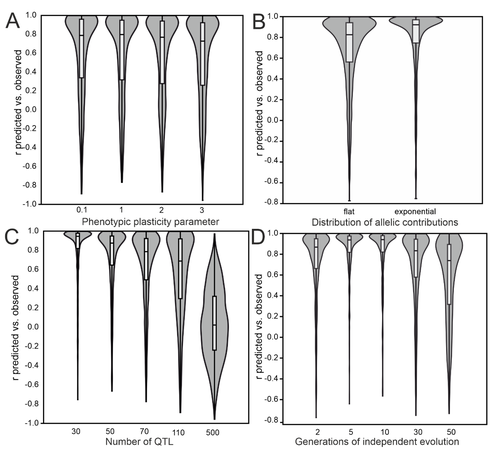
On the potential for GWAS with phenotypic population means and allele-frequency data (popGWAS)Markus Pfenninger https://doi.org/10.1101/2024.06.12.598621popGWAS: Data-efficient trait mapping in natural populations for biodiversity researchRecommended by Frédéric Guillaume based on reviews by Petri Kemppainen and 1 anonymous reviewer based on reviews by Petri Kemppainen and 1 anonymous reviewer
The study by Pfenninger (2025) addresses the critical need to understand the genomic basis of ecologically important traits to better predict and respond to the impacts of global change on biodiversity (Gienapp et al. 2017). It introduces the popGWAS, a novel GWAS approach, which utilizes phenotypic population means and genome-wide allele frequency data, obtainable through methods like Pool-sequencing (Pool-Seq), to identify the genetic loci underlying quantitative polygenic traits in natural populations and predict their mean. The core idea is that trait-increasing alleles should exhibit higher frequencies in populations with higher mean trait values. popGWAS then maps mean allele frequencies across populations to their trait means. Working with as many allele frequency values as populations sampled, popGWAS potentially has more power to find significant associations at genomic loci than individual-based GWAS working with three genotypes at a locus. This new method addresses some of the problems faced by traditional genome-wide association studies (GWAS), which require extensive resources and large sample sizes, posing challenges for biodiversity research on non-model species in natural populations. To evaluate the effectiveness of popGWAS, Pfenninger (2025) conducted extensive population genetic forward simulations, examining scenarios with varying numbers of populations, ranging from 12 to 60. The results indicated that popGWAS performance improved with increasing sample size, showing a diminishing return above 36 populations. In a direct comparison across all simulation scenarios, popGWAS consistently outperformed individual-based GWAS (iGWAS). On average, popGWAS identified more true positive loci than iGWAS. In addition, when combined with minimum entropy feature selection (MEFS), popGWAS achieved large predictive accuracy of population means of 0.8 or better in over 97% of simulations with 36 or more populations, regardless of other parameters. In contrast, iGWAS failed to generate valid phenotypic predictions in over 70% of the simulations. Also, unlike iGWAS, popGWAS did not suffer from p-value inflation. Yet, population structure or varying levels of relatedness among individuals were not fully accounted for in the simulations. The extent to which popGWAS would be sensitive to such individual covariates remains to be shown. Finally, popGWAS was relatively insensitive to low trait heritability because random individual variation gets averaged out when calculating the population mean trait value. The study demonstrates that popGWAS is a promising approach, particularly for oligogenic and moderately polygenic traits. The method performs more poorly for polygenic traits with large genetic redundancy, where different alleles contribute to the same trait mean in different populations. The method thus performs better when large-effect loci contribute to genetic differentiation in parallel across populations, as expected when gene flow is moderate to high (Yeaman & Whitlock 2011). Low genomic predictability is reached when drift dominates or when genetic architectures are highly polygenic. The popGWAS method proved effective with a moderate number of sampled populations and, when combined with machine learning for genomic prediction, exhibited strong performance in predicting population means, even for low-heritability traits. Notably, popGWAS consistently outperformed iGWAS in terms of identifying true positive loci and prediction accuracy. This suggests that popGWAS can make GWAS studies more accessible for biodiversity genomics research, providing a valuable tool for dissecting the genetic basis of complex traits in natural populations. A key aspect contributing to the efficiency of popGWAS is its compatibility with pooled sequencing (Pool-Seq). Pool-Seq provides estimates of allele frequencies within a population by sequencing a mixed DNA sample representing multiple individuals from that population (Futschik & Schlötterer 2010). This approach is significantly more cost-effective than sequencing each individual separately, allowing researchers to obtain genome-wide allele frequency data across multiple populations with a substantially reduced budget. This data efficiency makes GWAS more accessible to a wider range of researchers, particularly those working in biodiversity genomics where financial resources may be limited. Furthermore, popGWAS can be coupled with bulk phenotyping methods, such as automatic video recording, remote sensing, metabolomics/transcriptomics, etc., to efficiently obtain population-level phenotypic data, further streamlining the research process. Ultimately, popGWAS represents a valuable addition to the geneticist's toolkit, offering a complementary approach to iGWAS that can be particularly advantageous in specific research contexts where predicting trait mean is more important than resolving the precise genetic basis of a trait.
References Futschik, A. and Schlötterer, C. 2010. The Next Generation of Molecular Markers From Massively Parallel Sequencing of Pooled DNA Samples. Genetics 186(1): 207-218. https://doi.org/10.1534/genetics.110.114397 Gienapp, P., Fior, S., Guillaume, F., Lasky, J. R., Sork, V. L. and Csilléry, K. 2017. Genomic Quantitative Genetics to Study Evolution in the Wild. Trends Ecol. Evol. 32(12): 897-908. https://doi.org/10.1016/j.tree.2017.09.004 Markus Pfenninger (2025) On the potential for GWAS with phenotypic population means and allele-frequency data (popGWAS). bioRxiv, ver.3 peer-reviewed and recommended by PCI Evol Biol https://doi.org/10.1101/2024.06.12.598621 Yeaman, S. and Whitlock, M. C. 2011. The genetic architecture of adaptation under migration-selection balance. Evolution 65(7): 1897-1911. https://doi.org/10.1111/j.1558-5646.2011.01269.x
| On the potential for GWAS with phenotypic population means and allele-frequency data (popGWAS) | Markus Pfenninger | <p>It is vital to understand the genomic basis of differences in ecologically important traits if we are to understand the impact of global change on biodiversity and enhance our ability for targeted intervention. This study explores the potential... |  | Bioinformatics & Computational Biology, Evolutionary Applications, Genotype-Phenotype, Population Genetics / Genomics | Frédéric Guillaume | 2024-06-15 08:41:14 | View | |
18 Mar 2025
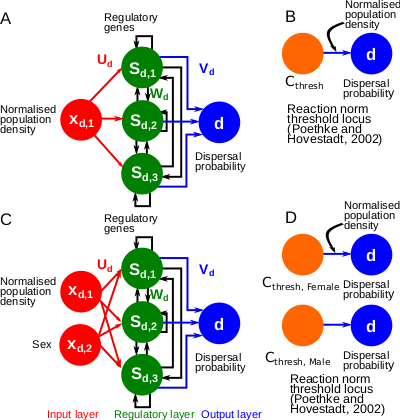
A gene-regulatory network model for density-dependent and sex-biased dispersal evolution during range expansionsJhelam N. Deshpande, Emanuel A. Fronhofer https://doi.org/10.1101/2023.07.18.549508Evolved gene-regulatory networks underlying dispersal plasticity can accelerate range expansionsRecommended by Charles Mullon based on reviews by Arnaud Le Rouzic and 2 anonymous reviewers based on reviews by Arnaud Le Rouzic and 2 anonymous reviewers
Natural populations rarely experience a uniform environment. Local density, resource availability, and mating opportunities often vary considerably across a population range. Theory has shown that such heterogeneity favours the evolution of density-dependent dispersal in the form of dispersal reaction norms. These models typically assume a simple genetic basis, with dispersal reaction norms encoded by a single Mendelian locus. Yet, dispersal plasticity is presumably controlled by more complex genetic architectures. Early work by Ezoe and Iwasa (1997) illustrated how evolved neural networks could generate dispersal reaction norms very similar to those predicted by Mendelian genetics.
In their manuscript, Deshpande and Fronhofer (2023) build on this work by examining how different genetic architectures influence the evolution of dispersal plasticity and its ecological consequences. They compare dispersal plasticity encoded either by a classical reaction norm controlled by a single Mendelian locus or by a gene-regulatory network following the Wagner model, where several interacting regulatory genes respond to local density cues and the individual's sex to determine dispersal probability.
Under stable conditions, both architectures successfully reproduce classical patterns of density- and sex-dependent dispersal. However, a clear difference emerges once populations expand into new, empty territories. Evolved gene-regulatory networks harbour substantially more cryptic genetic variation, which is revealed under these changing conditions. Previously hidden variation becomes exposed to selection at the expanding front, where low-density conditions create novel selective pressures. As a result, dispersal increases significantly, accelerating range expansions compared to the simpler, single-locus architectures.
These findings highlight how the genetic architecture of ecologically relevant traits, such as dispersal, not only shapes range dynamics but can also influence how populations respond to the demographic and environmental shifts encountered during expansion. By demonstrating that gene-regulatory networks facilitate faster range expansions due to their ability to store and later reveal cryptic genetic variation, Deshpande and Fronhofer take a useful step toward integrating genetic complexity into eco-evolutionary models.
References
Ezoe, H. and Iwasa, Y. (1997), Evolution of condition-dependent dispersal: A genetic-algorithm search for the ESS reaction norm. Popul Ecol, 39: 127-137. https://doi.org/10.1007/BF02765258
Jhelam N. Deshpande, Emanuel A. Fronhofer (2023) A gene-regulatory network model for density-dependent and sex-biased dispersal evolution during range expansions. bioRxiv, ver.4 peer-reviewed and recommended by PCI Evol Biol
| A gene-regulatory network model for density-dependent and sex-biased dispersal evolution during range expansions | Jhelam N. Deshpande, Emanuel A. Fronhofer | <p>Dispersal is key to understanding ecological and evolutionary dynamics. Dispersal may itself evolve and exhibit phenotypic plasticity. Specifically, organisms may modulate their dispersal rates in response to the density of their conspecifics (... |  | Adaptation, Evolutionary Ecology, Evolutionary Theory, Genotype-Phenotype, Phenotypic Plasticity | Charles Mullon | 2023-12-17 20:54:44 | View | |
15 Mar 2025
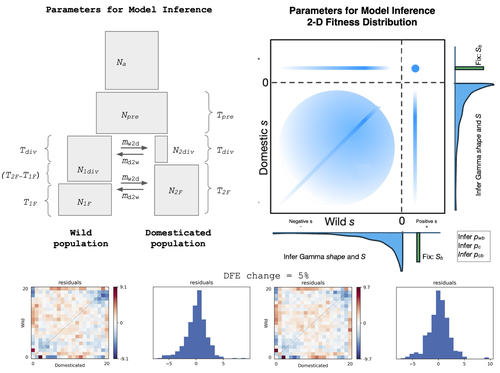
Detection of Domestication Signals through the Analysis of the Full Distribution of Fitness EffectsDavid Castellano, Ioanna-Theoni Vourlaki, Ryan N Gutenkunst, Sebastian E Ramos-Onsins https://doi.org/10.1101/2022.08.24.505198How the analysis of the distribution of fitness effects can reveal novel insights onto the genetics of domesticationRecommended by Matteo Fumagalli based on reviews by Miguel de Navascués and 1 anonymous reviewer based on reviews by Miguel de Navascués and 1 anonymous reviewer
The joint full distribution of fitness effects (DEF) is an important indicator in population genetic studies, and its inference has been the subject of intense research [1]. However, we still lack a solid framework to estimate DFE under certain demographic conditions. In this study, Castellano and colleagues propose to estimate the DFE by analysing the site frequency spectrum (SFS), and specifically develop a new approach for the joint DFE model inference [2]. The latter is based on the proportion of variants with divergent selection coefficients. Authors performed extensive simulations under models of domestication which is arguably one of the most crucial series of events in human evolution [3]. Domestication is associated with significant genetic costs in animals [4]. While DFE is typically estimated by contrasting SFS of silent and functional mutations [5], it has been recently suggested to use the joint SFS between domesticated and wild populations to estimate the DFE [6]. Authors build on this model and expand its parameterisation. Authors were able to dissect the impact of linked selection on inferred demographic history of wild and domesticated populations, with a robust estimation of the deleterious DFE. There are still several limitations in the interpretation of DFE as, for instance, some selective sweeps can bias their estimates and some demographic scenarios are challenging to infer. Also, classic quantitative trait models should be evaluated as a complementary approach. Finally, the in silico predictions presented in this study could be validated by empirical scans on existing genomic data sets. Nevertheless, this study is an important contribution to our understanding on how demography, and domestication in particular, can affect variants under selection in recent evolutionary histories. References [1] Eyre-Walker A, Keightley PD. The distribution of fitness effects of new mutations. Nat Rev Genet. 2007;8(8):610-618. https://doi.org/10.1038/nrg2146 [2] Castellano D, Vourlaki IT, Gutenkunst RN, Ramos-Onsins SE. Detection of Domestication Signals through the Analysis of the Full Distribution of Fitness Effects. BioRxiv 2025, ver.4 peer-reviewed and recommended by PCI Evol Biol https://doi.org/10.1101/2022.08.24.505198 [3] Frantz LAF, Bradley DG, Larson G, Orlando L. Animal domestication in the era of ancient genomics. Nat Rev Genet. 2020;21(8):449-460. https://doi.org/10.1038/s41576-020-0225-0 [4] Schubert M, Jónsson H, Chang D, et al. Prehistoric genomes reveal the genetic foundation and cost of horse domestication. Proc Natl Acad Sci U S A. 2014;111(52):E5661-E5669. https://doi.org/10.1073/pnas.1416991111 [5] Kousathanas A, Keightley PD. A comparison of models to infer the distribution of fitness effects of new mutations. Genetics. 2013;193(4):1197-1208. https://doi.org/10.1534/genetics.112.148023 [6] Huang X, Fortier AL, Coffman AJ, et al. Inferring Genome-Wide Correlations of Mutation Fitness Effects between Populations. Mol Biol Evol. 2021;38(10):4588-4602. https://doi.org/10.1093/molbev/msab162 | Detection of Domestication Signals through the Analysis of the Full Distribution of Fitness Effects | David Castellano, Ioanna-Theoni Vourlaki, Ryan N Gutenkunst, Sebastian E Ramos-Onsins | <p> Domestication is a process marked by complex interactions between demographic changes and selective pressures, which together shape genetic diversity. While the phenotypic outcomes of domestication are well documented, its genetic basis—p... |  | Adaptation, Evolutionary Dynamics, Genome Evolution, Molecular Evolution, Population Genetics / Genomics | Matteo Fumagalli | Parul Johri, Miguel de Navascués | 2024-05-10 15:17:06 | View |
13 Mar 2025
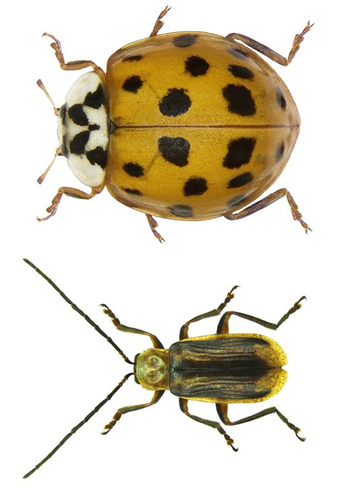
Unraveling genetic load dynamics during biological invasion: insights from two invasive insect speciesEric Lombaert, Aurelie Blin, Barbara Porro, Thomas Guillemaud, Julio S Bernal, Gary Chang, Natalia Kirichenko, Thomas W Sappington, Stefan Toepfer, Emeline Deleury https://doi.org/10.1101/2024.09.02.610743The genetic load of invasive population: how little do we know ?Recommended by Quentin Rougemont based on reviews by Sylvain Glémin and 2 anonymous reviewers based on reviews by Sylvain Glémin and 2 anonymous reviewers
We live both in a worrying and fascinating time. Worrying because human-induced global change has dramatic consequences on biodiversity around the world. Fascinating because these changes enable us to witness evolutionary processes unfolding on relatively short time scales. One such process is biological invasion. An intriguing evolutionary question is to understand which factor facilitates the success of an invasive species. In particular, serial bottlenecks at the expanding front should reduce the effective population size and decrease genetic diversity. Theoretically, this will increase the fixation of deleterious mutations due to the effect of genetic drift and overall affect the evolutionary potential of the invading species. In the short term, reduced genetic diversity and inbreeding in small populations increases the number of recessive deleterious variants exposed in a homozygous state. This may generate a reduction in mean fitness of the population. However, in the long term and under specific demographic scenarios recessive deleterious alleles may be more efficiently removed by purifying selection. Such purging may explain the success of invasion by reducing inbreeding depression and minimizing loss of fitness. Here, Lombaert et al. estimate the genetic load in two invasive insect species, a predator species, the harlequin ladybird (Harmonia axyridis) and a crop pest species, the western corn rootworm (Diabrotica virgifera virgifera). The authors smartly took advantage of a pool-seq transcriptome-based exome capture method to estimate genetic load and assess the purge hypothesis using standard population genetic statistics, such as the ratio of nonsynonymous over synonymous expected heterozygosity, the frequency of derived alleles, and their excess or deficit. The results revealed different patterns in the two species: In the western corn rootworm, the authors find a clear signal of reduced genetic diversity in invasive populations. This was associated with a slightly reduced genetic load. However, there was only marginal evidence of purging regarding the most deleterious mutations, and in a single population, with moderately deleterious variants being weakly purged, as theoretically expected. In the harlequin ladybird, in contrast, the reduction of genetic diversity in invasive populations has been small, a result related to the mild severity of the bottlenecks. In this species, the authors found a tendency toward fixation of the genetic load and no signal of purging. Such results are intriguing, showing that different species seem to exhibit contrasted fate of genetic load. Differences in the invasion history and ecology of the species may explain these patterns. This is one of the first studies to use a population genomics approach to study the genetic load associated with biological invasion. Future studies based on whole genome data collected at the individual level across multiple species are needed to better understand the dynamics of genetic load during biological invasion and to draw more general conclusions. Advances in forward simulations may also be used to shed light on the evolution of the genetic load at different stages of the invasion process and under different strengths of bottlenecks.
References Eric Lombaert, Aurelie Blin, Barbara Porro, Thomas Guillemaud, Julio S Bernal, Gary Chang, Natalia Kirichenko, Thomas W Sappington, Stefan Toepfer, Emeline Deleury (2025) Unraveling genetic load dynamics during biological invasion: insights from two invasive insect species. bioRxiv, ver.3 peer-reviewed and recommended by PCI Evol Biol https://doi.org/10.1101/2024.09.02.610743 | Unraveling genetic load dynamics during biological invasion: insights from two invasive insect species | Eric Lombaert, Aurelie Blin, Barbara Porro, Thomas Guillemaud, Julio S Bernal, Gary Chang, Natalia Kirichenko, Thomas W Sappington, Stefan Toepfer, Emeline Deleury | <p>Many invasive species undergo a significant reduction in genetic diversity, i.e. a genetic bottleneck, in the early stages of invasion. However, this reduction does not necessarily prevent them from achieving considerable ecological success and... |  | Bioinformatics & Computational Biology, Population Genetics / Genomics | Quentin Rougemont | 2024-09-04 10:35:53 | View | |
07 Feb 2025
Discordant population structure inferred from male- and female-type mtDNAs from Macoma balthica, a bivalve species characterized by doubly uniparental inheritance of mitochondriaSabrina Le Cam, Brémaud Julie, Vanessa Becquet, Valerie Huet, Pascale Garcia, Amélia Viricel, Sophie Breton, Eric Pante https://doi.org/10.1101/2022.02.28.479517Unraveling the Complexities of Mitochondrial Inheritance in Macoma balthica: Insights from Doubly Uniparental InheritanceRecommended by Rita Castilho based on reviews by Risto Väinölä and John WaresThe study by Le Cam and colleagues, entitled “Discordant population structure inferred from male- and female-type mtDNAs from Macoma balthica, a bivalve species characterized by doubly uniparental inheritance of mitochondria”, provides a fascinating exploration of the genetic structure and evolutionary dynamics of the Baltic tellin, Macoma balthica, a bivalve species exhibiting doubly uniparental inheritance (DUI) of mitochondria. This work is a significant contribution to the field of evolutionary biology, particularly in understanding how sex-specific mitochondrial inheritance can shape population structure and genetic diversity in marine organisms. DUI is a remarkable exception to the typical maternal inheritance of mitochondria in metazoans, where both males and females can transmit their mitochondria, but through different routes. In species with DUI, females pass on their mitochondria to all offspring, while males transmit their mitochondria exclusively to their sons. This system results in males being heteroplasmic, carrying both maternal (F-type) and paternal (M-type) mitochondrial DNA (mtDNA). The study leverages this unique inheritance pattern to investigate the genetic diversity, divergence, and population structure of M. balthica across its distribution range, from the North Sea to the Gironde Estuary in Southern France. One of the most striking findings of this study is the discordant population structure inferred from the male- and female-type mtDNAs. The authors sequenced the cox1 gene from both F-type and M-type mtDNA in 302 male individuals across 14 sampling sites. They found that the genetic differentiation between northern and southern populations was nearly three times higher for the M-type mtDNA compared to the F-type mtDNA. This discrepancy was further highlighted by the geographic localization of the strongest genetic break, which differed significantly between the two markers. For the F-type mtDNA, the break was located at the Finistère Peninsula, while for the M-type mtDNA, it was found at the Cotentin Peninsula, approximately 250 km apart. The authors propose several explanations for these differences, including a higher mutation rate, relaxed negative selection, and variations in effective population sizes for the M-type mtDNA. These factors could contribute to the observed divergence in genetic structure between the two mitochondrial types. Additionally, the study suggests that mito-nuclear genetic incompatibilities, arising from the interaction between mitochondrial and nuclear genes involved in oxidative phosphorylation and ATP production, could play a role in maintaining these genetic barriers. The study also provides valuable insights into the phylogeographic history of M. balthica. The divergence times estimated for the F-type and M-type mtDNA clades suggest that the split between the northern and southern populations occurred before the last glacial maximum (LGM). This finding supports a scenario of pre-LGM vicariance rather than post-glacial primary intergradation. The authors' use of net divergence to estimate the timing of cladogenesis events within the Macoma species complex adds a robust temporal dimension to their phylogeographic analysis. Another intriguing aspect of the study is the evidence of asymmetric introgression and hybrid zone dynamics. The authors observed that the genetic clines for the F-type and M-type mtDNAs were not only discordant in their geographic locations but also in their widths. The cline for the M-type mtDNA was significantly narrower than that for the F-type mtDNA, suggesting different selective pressures or migration balances acting on the two mitochondrial types. This finding raises important questions about the role of sex-specific selection and gene flow in shaping the genetic structure of populations with DUI. The study also highlights the importance of considering sex-specific genetic markers in population genetic studies. One of the most intriguing aspects is the implication that M-type mtDNA may be evolving under different constraints than its female counterpart. The authors found higher nucleotide diversity and net divergence in M-type sequences suggestive of a relaxed selective regime or an increased mutation rate, which aligns with previous studies on DUI species. Given that M-type mitochondria function predominantly in sperm cells, the potential for oxidative damage, reduced purifying selection, and a higher mutation rate could explain these patterns. More broadly, this finding reinforces the idea that mitochondrial genomes, though typically constrained by purifying selection, can evolve along sex-specific trajectories when their inheritance is decoupled from maternal transmission.
References Sabrina Le Cam, Brémaud Julie, Vanessa Becquet, Valerie Huet, Pascale Garcia, Amélia Viricel, Sophie Breton, Eric Pante (2025) Discordant population structure inferred from male- and female-type mtDNAs from Macoma balthica, a bivalve species characterized by doubly uniparental inheritance of mitochondria. bioRxiv, ver.4 peer-reviewed and recommended by PCI Evol Biol https://doi.org/10.1101/2022.02.28.479517 | Discordant population structure inferred from male- and female-type mtDNAs from Macoma balthica, a bivalve species characterized by doubly uniparental inheritance of mitochondria | Sabrina Le Cam, Brémaud Julie, Vanessa Becquet, Valerie Huet, Pascale Garcia, Amélia Viricel, Sophie Breton, Eric Pante | <p> Doubly Uniparental Inheritance (DUI) of mitochondria is a remarkable exception to the Strictly Maternal Inheritance (SMI) in metazoans. In species characterized by DUI --almost exclusively gonochoric bivalve mollusks-- females (F) transmi... | Phylogeography & Biogeography, Population Genetics / Genomics | Rita Castilho | 2022-03-03 10:22:01 | View | ||
31 Jan 2025
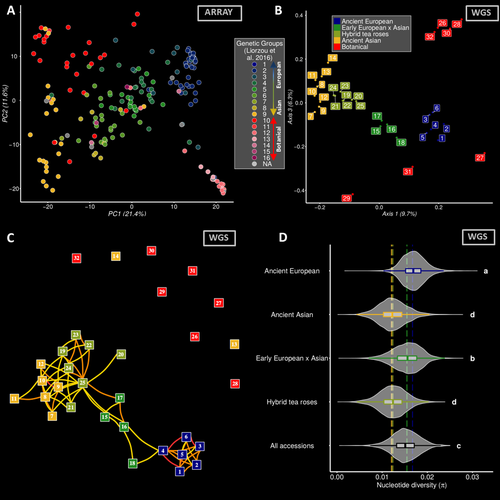
Dark side of the honeymoon: reconstructing the Asian x European rose breeding history through the lens of genomicsThibault Leroy, Elise Albert, Tatiana Thouroude, Sylvie Baudino, Jean-Claude Caissard, Annie Chastellier, Jerome Chameau, Julien Jeauffre, Therese Loubert, Saretta Nindya Paramita, Alix Pernet, Vanessa Soufflet-Freslon, Cristiana Oghina-Pavie, Fabrice Foucher, Laurence Hibrand-Saint Oyant, Jeremy Clotault https://doi.org/10.1101/2023.06.22.546162A genomic view on the history of rose garden breeding in EuropeRecommended by mathieu gautier based on reviews by Pierre Nouhaud, Vincent Segura and 1 anonymous reviewerRoses, a symbol of love and beauty, have a rich history of cultivation that spans millennia. While their aesthetic appeal has remained a constant, the genetic changes underlying their domestication and breeding remain intriguing. The manuscript titled "Dark side of the honeymoon: reconstructing the Asian x European rose breeding history through the lens of genomics" by Leroy et al. provides an unprecedented insight into the genomic shifts that accompanied the breeding history of roses in Europe during the 19th century. By leveraging on genotyping and whole-genome sequencing data from more than 200 accessions, this study reconstructs the genetic journey of roses from their European origins to their integration with Asian varieties. This work is particularly fascinating for evolutionary biologists, geneticists, and horticulturists alike, as it sheds light on several critical aspects of plant breeding history. The study provides compelling evidence of a rapid transition from predominantly European to a near-Asian genetic background within a few generations. This shift highlights the strong influence of Asian roses in shaping modern cultivated varieties, particularly through the introduction of recurrent blooming traits, novel colors, and scents. A striking finding is the reduction in genetic diversity that occurred during this transition, likely due to selective breeding practices that prioritized a narrow set of desirable traits. This discovery underscores the potential risks of genetic bottlenecks in cultivated plants and raises concerns about the long-term sustainability of modern rose breeding programs. The study also features a robust methodological framework applied to a unique data set which includes 204 rose accessions, covering both botanically and historically significant varieties. Whole genome sequencing of 32 accessions provides high-resolution insights into genomic evolution. Comprehensive phenotypic characterization over multiple years further allows in-depth investigation of the genetic architecture of key horticultural traits such as petal number, flowering time, disease resistance, and scent composition, with the building of the largest GWAS catalog for roses to date. Finally, the findings emphasize the need for sustainable breeding practices that balance genetic innovation with the preservation of historical diversity, by maintaining rose collections. Integrating ancient genetic resources into modern breeding programs could enhance resilience against diseases and environmental changes, while maintaining the aesthetic qualities that make roses so beloved. Overall, the manuscript by Leroy et al. is a landmark contribution to our understanding of the genomic history of rose breeding. By merging historical records with cutting-edge genomic analysis, the study not only reconstructs a critical phase of horticultural evolution but also provides invaluable insights for future breeding strategies. References Thibault Leroy, Elise Albert, Tatiana Thouroude, Sylvie Baudino, Jean-Claude Caissard, Annie Chastellier, Jerome Chameau, Julien Jeauffre, Therese Loubert, Saretta Nindya Paramita, Alix Pernet, Vanessa Soufflet-Freslon, Cristiana Oghina-Pavie, Fabrice Foucher, Laurence Hibrand-Saint Oyant, Jeremy Clotault (2024) Dark side of the honeymoon: reconstructing the Asian x European rose breeding history through the lens of genomics. bioRxiv, ver.4 peer-reviewed and recommended by PCI Evol Biol https://doi.org/10.1101/2023.06.22.546162 | Dark side of the honeymoon: reconstructing the Asian x European rose breeding history through the lens of genomics | Thibault Leroy, Elise Albert, Tatiana Thouroude, Sylvie Baudino, Jean-Claude Caissard, Annie Chastellier, Jerome Chameau, Julien Jeauffre, Therese Loubert, Saretta Nindya Paramita, Alix Pernet, Vanessa Soufflet-Freslon, Cristiana Oghina-Pavie, Fab... | <p>Roses hold significant symbolic value in Western cultural heritage, often serving as a symbol of love and romance. Despite their ancient cultivation, the appreciation for the phenotypic diversity of roses emerged relatively recently, notably du... |  | Genotype-Phenotype, Hybridization / Introgression, Population Genetics / Genomics | mathieu gautier | Vincent Segura, Anonymous, Pierre Nouhaud | 2024-04-18 12:28:31 | View |
14 Jan 2025
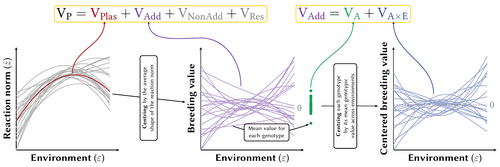
Partitioning the phenotypic and genetic variances of reaction normsPierre de Villemereuil, Luis-Miguel Chevin https://doi.org/10.32942/X2NC8BPhenotypic plasticity across traits, organisms and environments: decomposing the components of phenotypic varianceRecommended by Staffan Jacob based on reviews by Jarrod Hadfield and Thibaut Morel JournelPhenotypic plasticity can lead to rapid and important changes of trait distributions depending on environmental conditions, with important consequences for population dynamics, species interactions and adaptation. To better understand the evolution and importance of plasticity, we need to improve our ability to quantify and compare phenotypic plasticity among organisms, and estimate the evolutionary potential of plastic capacity. Plasticity is classically quantified through regression slopes, with units of traits per environment that by definition vary across organisms, traits and studies, and makes complex the comparison of how does plasticity vary across biological units, especially when linear versus quadratic reaction norms are considered. A clear methodology to quantify phenotypic plasticity in a way that allow for comparison across traits, organisms and environments is lacking. In this contribution, Pierre de Villemereuil and Luis-Miguel Chevin clarify key concepts about variability and evolutionary potential of plasticity, and propose an efficient method to partition phenotypic variance between genotype and environment. Expanding from the classical (too) simple regression slope approach, and directly integrating the genetic variability of plasticity, they provide a clear framework to quantify the part of phenotypic variance resulting from phenotypic plasticity, integrate the role of the shape of reaction norms, and estimate the heritable variation of trait plasticity. They integrate this method in a R package named Reacnorm, with step by step decision tree, that should greatly help the applicability of this framework. The authors here propose a contribution that simultaneously clarify key concepts and challenges about plasticity and reaction norms, being very interesting on the theoretical side, and is directly and quite simply applicable to any trait and organism. This should help and stimulate comparative studies of how does plasticity vary across traits, organisms and environmental contexts, both using already published datasets and through new experiments. References Pierre de Villemereuil, Luis-Miguel Chevin (2025) Partitioning the phenotypic and genetic variances of reaction norms. EcoEvorxiv, ver.4 peer-reviewed and recommended by PCI Evol Biol https://doi.org/10.32942/X2NC8B | Partitioning the phenotypic and genetic variances of reaction norms | Pierre de Villemereuil, Luis-Miguel Chevin | <p>Many traits show plastic phenotypic variation across environments, captured by their norms of reaction. These reaction norms may be discrete or continuous, and can substantially vary in shape across organisms and traits, making it difficult to ... |  | Evolutionary Ecology, Phenotypic Plasticity, Quantitative Genetics | Staffan Jacob | 2023-09-01 16:42:45 | View | |
03 Jan 2025
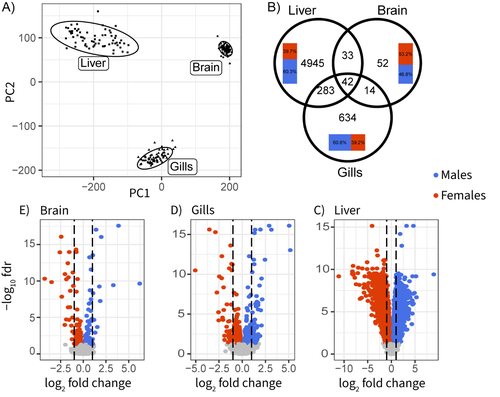
Sex-biased gene expression across tissues reveals unexpected differentiation in the gills of the threespine sticklebackFlorent Sylvestre, Nadia Aubin-Horth, Louis Bernatchez https://doi.org/10.1101/2024.06.09.597944Sex-biased gene expression in fish – a milestoneRecommended by Nicolas Galtier based on reviews by Qi Zhou and 2 anonymous reviewers based on reviews by Qi Zhou and 2 anonymous reviewers
There is a heavy body of literature on sex-biased gene expression, which can easily be tricky. One reason is that expression data are multi-dimensional, notoriously noisy, and highly sensitive to experimental conditions. Achieving reproducibility is, therefore, a challenge, especially in non-model organisms. Another reason is that the evolutionary forces shaping gene expression variation are complex, involving processes such as intra- and inter-locus conflicts between sexes, sex-chromosome evolution and degeneration, dosage compensation, cis vs. trans regulation, dominance, linkage, drift, etc... Not surprisingly, the field is rich in discordant studies, and a wide variety of situations have been described. The three-spined stickleback is a good illustration. This widely-studied fish displays conspicuous sexual dimorphisms, both morphological and behavioural. Yet, the existing literature regarding which genes and tissues are involved is remarkably unclear due to the lack of a comprehensive data set. Sylvestre et al. (1) here fix this issue. They sampled 40 wild-caught individuals in each of the two sexes and performed high-throughput sequencing of the transcriptome in three somatic tissues, dissected and preserved in the exact same conditions. This is an impressive effort, well above current standards. Data analysis delivered a series of neat results: gene expression in the liver is particularly sex-biased; the brain, in contrast, is remarkably little sex-differentiated despite the presence of courtship and paternal care in this species; gills show significantly sex-biased gene expression, which had been unnoticed previously despite the importance of this organ in fish ecotoxicology; the relatively young sex-chromosomes, finally, do not seem to experience dosage compensation, and are therefore enriched in sex-biased genes. Some of these results are consistent with previous studies in other fish species (2), here confirmed or demonstrated with a high degree of certainty. Others are new and worth considering in future studies of stickleback ecology and reproduction. We simply need more studies of this sort: well-conducted and clear-cut, recalling the career of its last author. References (1) Florent Sylvestre, Nadia Aubin-Horth, Louis Bernatchez (2024) Sex-biased gene expression across tissues reveals unexpected differentiation in the gills of the threespine stickleback. bioRxiv, ver.2 peer-reviewed and recommended by PCI Evol Biol https://doi.org/10.1101/2024.06.09.597944 (2) Iulia Darolti I, Judith E. Mank (2023). Sex-biased gene expression at single-cell resolution: cause and consequence of sexual dimorphism. Evolution Letters 7(3):148-156. https://doi.org/10.1093/evlett/qrad013
| Sex-biased gene expression across tissues reveals unexpected differentiation in the gills of the threespine stickleback | Florent Sylvestre, Nadia Aubin-Horth, Louis Bernatchez | <p>Sexual dimorphism can evolve through sex-specific regulation of the same gene set. However, sex chromosomes can also facilitate this by directly linking gene expression to sex. Moreover, differences in gene content between heteromorphic sex chr... |  | Expression Studies, Genetic conflicts, Genome Evolution, Molecular Evolution, Reproduction and Sex | Nicolas Galtier | 2024-06-11 18:57:06 | View | |
18 Dec 2024
Investigating the effects of diurnal and nocturnal pollinators on male and female reproductive success and on floral trait selection in Silene dioicaBarbot Estelle, Dufaÿ Mathilde, Godé Cécile, De Cauwer Isabelle https://doi.org/10.5281/zenodo.11488687More in less: almost everything you wanted to know about sex in flowers is in a single experiment with a single plant speciesRecommended by Juan Arroyo and Violeta Simón-Porcar and Violeta Simón-Porcar based on reviews by Luis Gimenez-Benavides, Andrea Cocucci, Giovanni Scopece and 1 anonymous reviewer based on reviews by Luis Gimenez-Benavides, Andrea Cocucci, Giovanni Scopece and 1 anonymous reviewer
Most flowering plants (almost 90% of species) are pollinated by animals (Ollerton et al. 2011). In fact, many plants are completely dependent on pollinator visits for reproductive success, due to the complete inability of selfing if they are self-incompatible or have strong gender differentiation, as in dioecious plants. Others have diminished reproductive output in the absence of pollinators, even being self-compatible, if their flowers present strong herkogamy or dichogamy, making autonomous selfing more difficult. Ultimately, all animal-pollinated plant species rely on pollinators for outcrossing. Depending on the genetic structure of plant populations and the movement patterns of these animals, outcrossing patterns will shape the population genetic variation, which will determine its adaptive fate. Thus, understanding the mechanisms governing the pollination interaction is crucial for unraveling the uncertainties of a huge proportion of biodiversity on Earth. Being mutualistic by definition, the animal side of this interaction is less understood, despite most pollinator groups being likely dependent on it for their persistence and perhaps diversity (Ollerton 2017). The role of pollinators in plant diversification has generated much literature and controversy ever since Darwin and his “abominable mystery” about angiosperm diversification (Friedman 2009). However, the other way around, that of plant`s effect on pollinator diversification, is more debatable. A remarkable example of this effect is the possible case of co-speciation mediated by nursery (brood site) pollination, which also includes antagonistic insect herbivory (Wiens et al. 2015), as in some Silene species and their moth pollinators and herbivores (Hembry and Althoff 2016). The authors of this recommendation benefitted from grants provided by grants PID2021-122715NB-I00 and TED2021-131037B-I00 funded by MCIN/AEI/ 10.13039/501100011033 and by the “European Union NextGeneration EU/PRTR”, and by MSCA-IF-2019-89789. Barbot, E., Dufaÿ, M., Godé, C., & De Cauwer, I. (2024). Exploring the effect of scent emission and exposition to diurnal versus nocturnal pollinators on selection patterns on floral traits. Zenodo. https://doi.org/10.5281/zenodo.11490231 Friedman, W. E. (2009). The meaning of Darwin's “abominable mystery”. American Journal of Botany, 96(1), 5-21. https://doi.org/10.3732/ajb.0800150 Haran, J., Kergoat, G. J., & de Medeiros, B. A. (2023). Most diverse, most neglected: weevils (Coleoptera: Curculionoidea) are ubiquitous specialized brood-site pollinators of tropical flora. Peer Community Journal, 3. https://doi.org/10.24072/pcjournal.279 Hembry, D.H. and Althoff, D.M. (2016), Diversification and coevolution in brood pollination mutualisms: Windows into the role of biotic interactions in generating biological diversity. American Journal of Botany, 103: 1783-1792. https://doi.org/10.3732/ajb.1600056 Kephart, S., Reynolds, R. J., Rutter, M. T., Fenster, C. B., & Dudash, M. R. (2006). Pollination and seed predation by moths on Silene and allied Caryophyllaceae: evaluating a model system to study the evolution of mutualisms. New Phytologist, 169(4), 667-680. https://doi.org/10.1111/j.1469-8137.2005.01619.x Kulbaba, M. W., & Worley, A. C. (2013). Selection on Polemonium brandegeei (Polemoniaceae) flowers under hummingbird pollination: in opposition, parallel, or independent of selection by hawkmoths?. Evolution, 67(8), 2194-2206. https://doi.org/10.1111/evo.12102 Nunes, C. E. P., Maruyama, P. K., Azevedo-Silva, M., & Sazima, M. (2018). Parasitoids turn herbivores into mutualists in a nursery system involving active pollination. Current Biology, 28(6), 980-986. https://doi.org/10.1016/j.cub.2018.02.013 Ollerton, J. (2017). Pollinator diversity: distribution, ecological function, and conservation. Annual review of ecology, evolution, and systematics, 48(1), 353-376. https://doi.org/10.1146/annurev-ecolsys-110316-022919 Ollerton, J., Winfree, R., & Tarrant, S. (2011). How many flowering plants are pollinated by animals?. Oikos, 120(3), 321-326. https://doi.org/10.1111/j.1600-0706.2010.18644.x Prieto-Benitez, S., Yela, J. L., & Gimenez-Benavides, L. (2017). Ten years of progress in the study of Hadena-Caryophyllaceae nursery pollination. A review in light of new Mediterranean data. Flora, 232, 63-72. https://doi.org/10.1016/j.flora.2017.02.004 Raguso, R. A. (2008). Wake up and smell the roses: the ecology and evolution of floral scent. Annual review of ecology, evolution, and systematics, 39(1), 549-569. https://doi.org/10.1146/annurev.ecolsys.38.091206.095601 Simón-Porcar, V. I., Meagher, T. R., & Arroyo, J. (2015). Disassortative mating prevails in style-dimorphic Narcissus papyraceus despite low reciprocity and compatibility of morphs. Evolution, 69(9), 2276-2288. https://doi.org/10.1111/evo.12731 Suetsugu, K. (2023). A novel nursery pollination system between a mycoheterotrophic orchid and mushroom-feeding flies. Ecology, 104(11), e4152. https://doi.org/10.1002/ecy.4152 Wiens, J. J., Lapoint, R. T., & Whiteman, N. K. (2015). Herbivory increases diversification across insect clades. Nature communications, 6(1), 8370. https://doi.org/10.1038/ncomms9370 | Investigating the effects of diurnal and nocturnal pollinators on male and female reproductive success and on floral trait selection in Silene dioica | Barbot Estelle, Dufaÿ Mathilde, Godé Cécile, De Cauwer Isabelle | <p>Plant species with mixed pollination systems are under pollinator-mediated selection by both diurnal and nocturnal pollinator species. This could impact the strength and potentially direction of selection on floral traits, as different pollinat... | Evolutionary Ecology, Reproduction and Sex | Juan Arroyo | 2024-06-05 15:52:46 | View | ||
18 Nov 2024
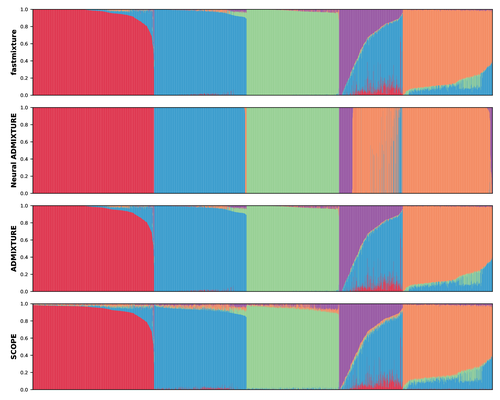
Faster model-based estimation of ancestry proportionsCindy G. Santander, Alba Refoyo Martinez, Jonas Meisner https://doi.org/10.1101/2024.07.08.602454fastmixture generates fast and accurate estimates of global ancestry proportions and ancestral allele frequenciesRecommended by Matteo Fumagalli based on reviews by Oscar Lao Grueso and 2 anonymous reviewers based on reviews by Oscar Lao Grueso and 2 anonymous reviewers
The estimation of ancestry proportions in individuals is an important analysis in both evolutionary biology and medical genetics. However, popular tools like ADMIXTURE (Alexander et al. 2009) and STRUCTURE (Pritchard et al. 2000) do not scale well with the large amount of data currently available. Recent alternative methods, such as SCOPE (Chiu et al. 2022), favour scalability over accuracy. In this study, Santander and coworkers introduce a new software, called fastmixture, which estimates ancestry proportions and ancestral allele frequencies using novel implementations for initialisation and convergence of its model-based algorithm (Santander et al. 2024). In simulated datasets, fastmixture displays desirable properties of speed and accuracy, with its performance surpassing commonly used software (Alexander et al. 2009, Pritchard et al. 2000, Chiu et al. 2022, Mantes et al. 2023). fastmixture is almost 30 times faster than ADMIXTURE under a complex model with five ancestral populations, while retaining similar accuracy levels. When applied to data from the 1000 Genomes Project (1000 Genomes Project Consortium 2025), fastmixture recapitulated expected levels of global ancestry. The new software is freely available on GitHub with an accessible documentation. fastmixture accepts input files in PLINK format. It remains an open question whether extensive parameter tuning could increase the scalability and accuracy of established methods. A comprehensive assessment of fastmixture over a wide range of data processing options (Hemstrom et al. 2024) is also missing. Finally, whether model-based approaches are fully scalable to ever increasing biobank datasets is still under debate. Nevertheless, the superior computational performance of fastmixture is evident and it is likely that this new software will soon replace existing popular tools to estimate global ancestry proportions. References Alexander DH, Novembre J, Lange K. Fast model-based estimation of ancestry in unrelated individuals. Genome Res. 2009;19(9):1655-1664. https://doi.org/10.1101/gr.094052.109 Pritchard JK, Stephens M, Donnelly P. Inference of population structure using multilocus genotype data. Genetics. 2000;155(2):945-959. https://doi.org/10.1093/genetics/155.2.945 Chiu AM, Molloy EK, Tan Z, Talwalkar A, Sankararaman S. Inferring population structure in biobank-scale genomic data. Am J Hum Genet. 2022;109(4):727-737. https://doi.org/10.1016/j.ajhg.2022.02.015 Santander CG, Refoyo Martinez A, Meisner J. Faster model-based estimation of ancestry proportions. bioRxiv 2024; ver.2 peer-reviewed and recommended by PCI Evol Biol. https://doi.org/10.1101/2024.07.08.602454 Mantes AD, Montserrat DM, Bustamante CD, Giró-I-Nieto X, Ioannidis AG. Neural ADMIXTURE for rapid genomic clustering. Nat Comput Sci. 2023;3(7):621-629. https://doi.org/10.1038/s43588-023-00482-7 1000 Genomes Project Consortium, Auton A, Brooks LD, et al. A global reference for human genetic variation. Nature. 2015;526(7571):68-74. https://doi.org/10.1038/nature15393 Hemstrom W, Grummer JA, Luikart G, Christie MR. Next-generation data filtering in the genomics era. Nat Rev Genet. 2024;25(11):750-767. https://doi.org/10.1038/s41576-024-00738-6 | Faster model-based estimation of ancestry proportions | Cindy G. Santander, Alba Refoyo Martinez, Jonas Meisner | <p>Ancestry estimation from genotype data in unrelated individuals has become an essential tool in population and medical genetics to understand demographic population histories and to model or correct for population structure. The ADMIXTURE softw... |  | Bioinformatics & Computational Biology, Human Evolution, Population Genetics / Genomics | Matteo Fumagalli | 2024-07-14 11:48:39 | View |
FOLLOW US
MANAGING BOARD
Dustin Brisson
Julien Dutheil
Marianne Elias
Inês Fragata
François Rousset
Sishuo Wang










